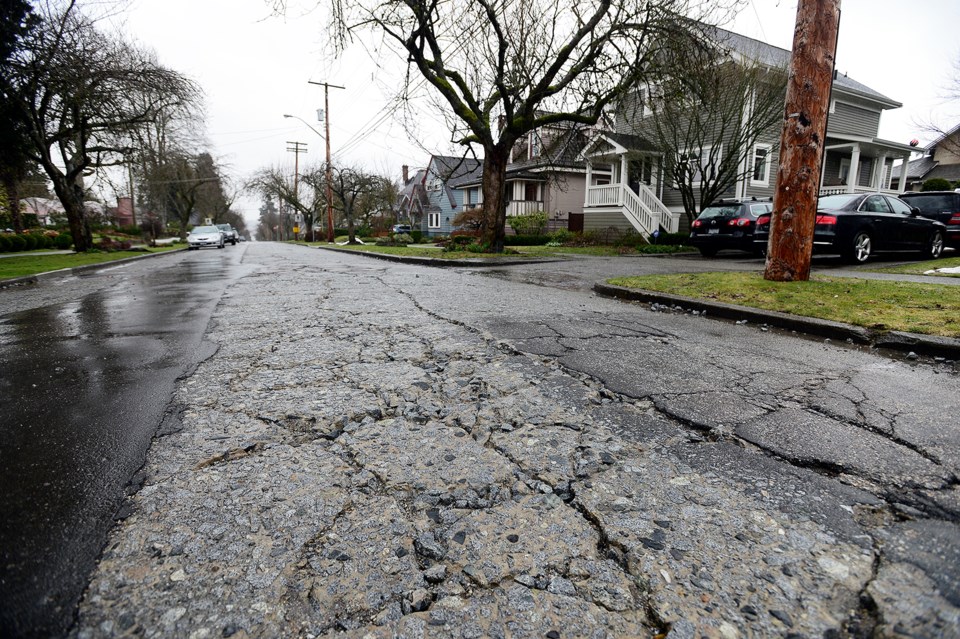If you think the streets in your neighbourhood are cracking up, you may be right.
New Westminster is home to 227 kilometres of roads, including 13 km in Queensborough, 14 km in the Major Roads Network that are funded by TransLink, 55 km of major city roads (arterials, collectors, and local roads providing bus service) and 142 km of minor roads including local roads and lanes.
Roger Emanuels, the city’s manager of design and construction, said conditions are getting better on the Major Road Network and major city roads that accommodate buses and goods movement, as a result of the investment that’s been put into paving those roads.
“We have actually kind of fallen behind on our local roads,” he told council Monday. “We probably have to retune our funding and spend a little more on our local roads to start addressing the backlog that we have got on our locals.”
A report presented to council on March 6 indicates that about 12.9 per cent of “minor roads” in New West have cracking, compared to 5.6 per cent in 2006. The regional average is around seven per cent.
“We are quite a bit higher than the surrounding municipalities,” Emanuels said. “Part of that is our local road network is quite a bit older than the surrounding municipalities.”
The report notes the city has steadily been increasing its budget for pavement management since 2006 and has budgeted $4.4 million in the 2017 capital budget.
According to the report, it’s is anticipated the city would require a budget closer to $5 million annually to improve the “all cracked area” to eight per cent. Based on funds proposed in the 2017 to 2021 capital budget, the city would slowly improve the cracking on the road network to 10 per cent.
Emanuels noted that the winter conditions experienced this year will also result in more problems with local roads. He said the city’s road replacement program has generally been driven by replacement of utilities like sewer and water mains.
“We probably have to accelerate that and start doing more paving, maybe ahead of our utility works or advancing some utility works so that we can actually get that paving done,” he said. “We don’t want to pave a road one year and come back and do a water main or a sewer main after we have done that.
As an older community, New Westminster struggles with an aging infrastructure, including roads, said Mayor Jonathan Cote.
“It’s interesting to note that in 2006 we spent just over half-a-million dollars. We are now spending almost $4.5 million, and yet in many regards we are still falling behind,” he said. “I think the report really does highlight that in terms of the major roads we are doing a good job and keeping pace, but on the more local road network we are falling behind. We are going to have to have a look at that to keep the road conditions to a point where we’d like to keep them in.”
The report defines pavement management as the process of planning the maintenance and repair of the road network in order to optimize pavement conditions over the entire network.
“In a pavement management program, you will actually go and mill and pave a road before the public actually thinks it needs to be done,” Emanuels said of the road repairs. “That’s because you are actually addressing it at the right time, before the cracking gets too bad and it starts deteriorating and your maintenance funds start to go up.”



